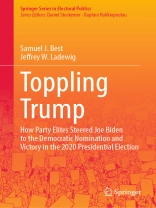This book tells the story of the 2020 presidential election campaign, exploring how Joe Biden secured the Democratic nomination and defeated Donald Trump in the general election. It argues that Democratic Party elites paved the way for Biden’s victory, enabling him to overcome numerous campaign missteps to defeat one of the largest, wealthiest, most competitive fields in history. It details how elites discouraged potential rivals from entering the race, orchestrated rules to truncate the field, and steered voters toward Biden’s candidacy both directly and indirectly. It shows how they helped the Biden campaign overcome early defeats in the first several contests and turn his campaign around. And it shows the critical role they played in mobilizing partisans to help Biden win the general election campaign and thwarting efforts to undermine his victory. Simply put, the book demonstrates that Biden would not have won the White House without maneuvering and manipulation by the Democratic establishment.
Inhaltsverzeichnis
Chapter 1: The Invisible Hand.- Chapter 2: A Nation Divided Against Itself.- Chapter 3: Democrats Explore Their Options.- Chapter 4: Elites Have Their Say.- Chapter 5: The Limitations of Party Influence.- Chapter 6: The Establishment Strikes Back.- Chapter 7: Covid Infects the Campaign.- Chapter 8: Republicans Stand By Trump.- Chapter 9: A Battle of the Bases.- Chapter 10: The Parties Go Toe-to-Toe.- Chapter 11: The Conflict Rages On.
Über den Autor
Samuel J. Best is a Professor of Political Science at the University of Connecticut. He received a Bachelor of Arts in Economics and Political Science at the University of North Carolina and a Ph D from the State University of New York at Stony Brook. He is the former Director of the Center for Survey Research and Analysis at the University of Connecticut. He has authored or co-authored numerous books and articles on public opinion and political behavior, including
Exit Polls: Surveying the American Electorate, 1972-2010 and
Internet Data Collection.
Jeffrey W. Ladewig is an Associate Professor of Political Science at the University of Connecticut. He received a Bachelor of Arts in Economics and Political Science at the University of Wisconsin and a Ph D from the University of Texas. He has written scholarly articles on legislative behavior, political economy, congressional apportionment, and environmental politicsfor journals such as
The Journal of Politics,
American Politics Research,
Political Research Quarterly,
Public Opinion Quarterly, and
Environmental Politics.












